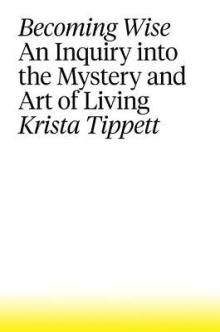Here are some passages from Krista Tippett’s book Becoming Wise: An Inquiry into the Mystery and Art of Living, passages that struck, inspired, challenged me.
 In connection with the Irish poet and philosopher John O’Donohue, she mentions his belief in ‘the possibility of creating our own inner landscapes of beauty, to keep us vital in the midst of bleak and dangerous surroundings and experiences’, a need that, as many of us know only too well, may arise at any time.
In connection with the Irish poet and philosopher John O’Donohue, she mentions his belief in ‘the possibility of creating our own inner landscapes of beauty, to keep us vital in the midst of bleak and dangerous surroundings and experiences’, a need that, as many of us know only too well, may arise at any time.
Talking about the work of philosopher and L’Arche founder Jean Vanier, she quotes his vitally important vision ‘to educate people to relate, to listen, to help people to become themselves’ rather than, as is so often the case, to subject them to a preconceived agenda, whatever that may be.
And she quotes john a. powell, Professor of Law and Professor of African American Studies and Ethnic Studies, who notes that:
people are looking for community, right now, though we don’t have confidence in love. We have much more confidence in anger and hate. We believe anger is powerful. We believe hate is powerful. And we believe love is wimpy. And so if we’re engaged in the world, we believe it’s much better to sort of organize around anger and hate.
Lovers, by contrast, as Tippett herself points out are artists who are ‘reaching out to enemies, embracing complexity, creativity, and risk’.
Lastly, here are some words from geophysicist Xavier Le Pichon, also taken from Tippett’s book, words whose truth I have come to know in my own experience:
once you enter into this way of, I would call it companionship, walking with the suffering person who has come into your life and whom you have not rejected, your heart progressively gets educated by them. They teach you a new way of being.
We have to be educated by the other. My heart cannot be educated by myself. It can only come out of a relationship with others. And if we accept being educated by others, to let them explain to us what happens to them, and to let yourself be immersed in their world so that they can get into our world, then you begin to share something very deep.

 ooking for something else, I stumbled across some quotes I copied from Wm. Paul Young’s The Shack some time ago. This book had a profound impact upon me at a time of the most intense inner turmoil. Rereading the extracts many months later, I was once again touched by the deep wisdom found in these lines.
ooking for something else, I stumbled across some quotes I copied from Wm. Paul Young’s The Shack some time ago. This book had a profound impact upon me at a time of the most intense inner turmoil. Rereading the extracts many months later, I was once again touched by the deep wisdom found in these lines.